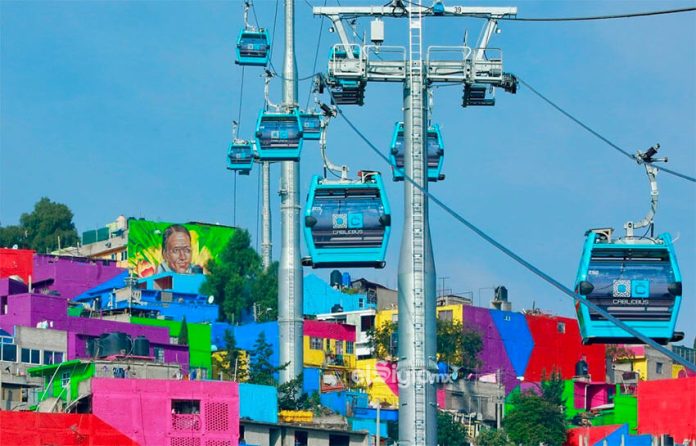The longest cable car line in Latin America was opened by Mexico City Mayor Claudia Sheinbaum in the east of the capital on Sunday, less than a month since the first line of the system went into full operation.
Line 2 of the Cablebús improves connectivity in working class Iztapalapa – the most populous municipality in the country – through seven stops linking Metro stations Constitución de 1917 and Santa Marta by a 36-minute journey end-to-end. The 10.8-kilometer line will transport up to 108,000 passenger daily in 305 cabins, cutting the journey by almost 50 minutes, and cost 3.18 billion pesos (almost US $159 million) to build.
Line 1 went into full operation on June 11, connecting the Gustavo A. Madero borough to the Indios Verdes Metro and bus station. It has registered 56,000 users per day compared to the 48,000 predicted, which makes it the second most used cable car in Latin America, even by pre-pandemic numbers, according to city officials.
Cabins on both lines have capacity for 10 passengers, but only six are currently permitted due to coronavirus restrictions.
The inauguration of Line 2 saw a festive atmosphere with dancers and drummers and 100 murals by 35 urban artists revealed on the new line and its surroundings. Around 500 people attended. Some shouted “President! President!” to Sheinbaum who has long been touted as Morena’s next presidential candidate.
The mayor pointed to the social benefits of the new transport option. “The Cablebús project represents not only an investment in public transport – massive, modern, innovative and non-polluting – but one that reduces inequality, that gives dignity to a population that has been historically overlooked,” she said, adding that public investment was urgent in the municipality, one of the 15 most violent in the country.
While joking that the area would now be recognized for more than just cumbia band Los Ángeles Azules, she noted that the new airborne transport system was the fruit of an administration that is not corrupt.
Iztapalapa Mayor Clara Brugada said the area would be transformed entirely. “Today Iztapalapa ceases to be the backyard of Mexico City, the garbage dump of Mexico City. Today Iztapalapa takes flight,” she said.
Resident Óscar Méndez immediately saw benefits in safety and efficiency. “Before it took me an hour and a half or more to get to Santa Marta, but now they say it will be half an hour and it’s going to be safer. The truth is that taking a minibus is like flipping a coin: you don’t know what’s going to happen; whether you’re going to get assaulted or you’re going to get stuck in traffic. This [the cable car] looks great,” he said.
The first cable car to open in the Valley of México was the Mexicable in Ecatepec in October 2016. A new 8.2-kilometer line is under construction in the same municipality, and there have been discussions about a new cable car service in the west of Mexico City in Naucalpan, and another in the southwest of the city to connect the neighborhoods of Magdalena Contreras and Tlalpan.
Line 2 runs each day until 11:00 p.m. and starts Monday to Friday at 5:00 a.m, Saturday at 6:00 a.m. and Sundays and public holidays at 7:00 a.m. Trips cost 7 pesos and are free for adults over 60, people with disabilities and children under 5. Passengers can travel with a bicycle Monday-Friday.
With reports from Milenio
